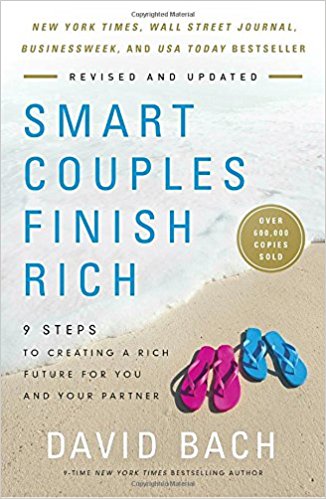It has been a month since I got married. And of course one of my goals is for our starting family to have a solid financial plan so we can ‘finish rich’. Now I know a LOT about personal finance; but when it comes to family finance, I admit to having minimal personal experience. So I read the book “Smart Couples Finish Rich” by David Bach and applied the exercises there.
In this article, I will be sharing the major points I learned from reading and applying the lessons from this amazing book.
#1 Your Personal Values

I found it very interesting that the first major exercise in the book was not about money. It did not begin with the income statements or the statement of assets and liabilities, or with insurance and investments.
The first thing the book focused on was each individual’s “personal values”. It was not about the money. It was what money represented in each of our lives. And being able to understand one another’s values was the first step to ‘finishing rich’.
The first lines that really hit me were the following:
The two of you were probably raised differently when it came to money.
The two of you probably value money differently.
The two of you probably spend money differently.
How you spend money has nothing to do with how much you love each other.
In fact, money has very little to do with love… and a lot to do with how much you fight.
— David Bach
Smart Couples Finish Rich
Upon reflecting on this, I realized that while I’ve been exposed to hundreds of financial books, and I knew all my personal and financial goals, I had absolutely NO idea what my partner’s money values were! (And she also most likely had no idea what money meant for me as well.)
So we set on to do the first exercise: The Values Circle. Here’s how the exercise works:
- Prior to the exercise, both of us had already agreed to devote time to work on our ‘financial plans’. So this was not a spur-of-the-moment activity. I feel that I had to mention this because both of you really need to be ‘fully present’ to get the most out of this activity.
- Taking turns, each one of us would answer the questions: What’s really important to you? What’s the purpose of money in your life?
- The partner’s duty was to listen, and clarify what that value meant, and list it down.
- Repeat the process until each of you have about 5 values listed down.
Here’s an example:
J3: What’s really important to you? What’s the purpose of money in your life?
Mae: Family
J3: What do you mean by family?
Mae: Yung providing a good life for them.
J3: When you say a good life, what do you mean?
Mae: Like for example kay Daddy, he wants to retire in Bataan, so I want to make sure he’s taken care of…..
We went back and forth with reflecting and listening to each other until we came up with these 10 values (in no specific order).

Note 1: Sometimes we use the same words, but it means different things. This is why it’s important to probe and clarify what the word really means for them.
Note 2: If you will be doing this exercise with your partner, please try to get a copy of the book: “Smart Couples Finish Rich” because it will give you lots of tips how to talk about money as a couple.
Once both of us knew what’s really important to us, we then moved on to our Life Goals.
#2 Life Goals

The life goals are the specific things that we would like to be, have, or do in relation to each value listed down in #1. For instance, my Security value translated into a goal of building up our emergency funds. While Mae’s Health value translated into a goal of exercising 3x a week. For our Family and Relationship values, it was translated into our trips to the Philippines, to the US and Canada where our families resided.
Note: Sometimes these goals don’t require any financial resources, and that’s perfectly fine. Also, if you have a goal that already meets two values, that is also acceptable! You’re hitting two birds with one stone.
The important aspect here is that each value is represented into a goal. And that means in the next 12 months, you’re building a life towards what’s really important to you.
Once we listed down our goals. We ended our ‘financial planning’ session and called it a night. And our next session would now cover our monthly budget, wherein the objective is to plan how we would be able to finance our goals.
#3 The Monthly Budget

Before I share how we went about our budget planning, I would just like to emphasize the importance of the previous two steps: Identifying Your Values & Goals. Because life should never be just about the money. Money is just a resource to help us get what we want out of life, to create the lifestyle that we desire. That’s why it is really not recommended to go into step #3, without understanding your values and without setting goals. If you go straight into the monthly budget, then the whole activity will be meaningless.
Anyway, in creating the monthly budget there were four things that we had to list down. Namely:
- Income (regular monthly + annual bonuses)
- Expenses (estimated monthly + ad-hoc/as-needed expenses)
- Assets (savings & investments)
- Liabilities (debts & long-term payment commitments)
I won’t be listing down the specifics anymore because each household will definitely be unique. But ultimately the goal of this exercise was to answer the following questions:
- Financially, where are we right now?
- Financially, where do we want to go?
- What do we have to do, on a day to day, week to week, and month to month basis,
in order to get there?
By trying to answer these questions we were then able to set the household budgets, our personal allowances, our savings, and the amounts were we setting aside for each goal that we had. More importantly, we also agreed on our monthly routines to update our financial statements, allocate our savings and make sure that we are on track with our goals.
Now, I know I skipped a whole lot of the story on how we specifically computed for the numbers. I purposely left that out since cashflow and asset management can’t be explained in just one article. But if you are deeply interested in the topic, I recommend that you get a personal finance book, or you can enrol in my “Winning the Game of Wealth Online Seminar. This way you have an actual activity/step-by-step guide for your financial plans.
But not to leave you hanging, here are three very important tip when working out your monthly budget. First is to be patient. This process will take you a couple of hours, so it would be best to break them down into multiple ‘sessions’. (We personally took about 4 hours broken down into 3 sessions) Second, never put pressure on your partner to spend less – this will turn every aspect of the budget into a debate. Lastly, as you will be working on ways to reduce spending, don’t forget to also find ways to increase your income.
#4 Contingency Plans (Insurance, Healthcare and Investments)

Once we finished working out our monthly budget, it now came to the hard ‘hypothetical conversations. This meant answering the questions:
- What if one of us gets terribly sick, or passes away?
- How would we want to take care of the people we are leaving behind?
- How much exactly do we need to do this?
Now admittedly we are still in the middle of this process. Mae has inquired with her company what her healthcare coverage is. Meanwhile I have been scouting different insurance plans and providers. Additionally, we’ve set aside a budget for our future healthcare needs as well.
In doing this process together, I believe the most valuable benefit, is that both of are aware of exactly what we will do if the other passes away. And no one is left clueless. Because imagine if something devastating happens, the last thing we would want to do to each other, is to make each other worry about the money. So we would rather talk about it now, and plan it while both of us can still talk (haha.)
And that almost wraps up everything but there’s one more important topic. And that is…
#5 Sex, Family Planning & Family Planning Methods

Now that we have all these plans and budgets and monthly cashflows laid out… all of these plans will have to be overhauled if we suddenly have a baby!
And just to share with you, our plan is to have our first baby in the year 2017. We first want to be able to travel Europe and enjoy it as a couple with no kids first. And to do that, well of course we had to talk about sex and family planning methods. (Both of us are Catholics, so are happy to use Natural Family Planning Methods only).
And I have to be just flat out candid here, the human reproductive system is just extremely complex. When I was learning how to: count the days, predict and estimate ovulation, track the basal temperature, and use mucus method. So we could to determine when we can do it, and when we shouldn’t do it, my goodness, I felt like I was learning how to invest in the stock market all over again!
And as complicated as it may seem at first, the amazing thing is that we are really working together as a couple to make our plans happen even in matters as intimate as this. And the feeling of being close to your partner up to this level, that is truly something special.
Now it’s not my intention to meddle in your intimate affairs, but this is a reminder that you should talk about this. If you need help on learning the methods, there are many resources online, you can consult your ObGyn doctor, and there are also multiple institutions that offer seminars and workshops.
Final Notes
Now let’s have a recap! Here are the topics you should plan on talking about soon:
- Personal Values
- Your Life / Couple Goals
- The Monthly Cashflow and Budgets
- Contingency Plans (Healthcare, Insurance and Investments)
- Sex & Family Planning
I know I presented lots of things to do here. But be patient with yourselves and do not rush it. After all, it’s a continuous and ongoing process of working together. The most important part is that you get started with your discussions, and of course you do it together.
Sharing Tip: If you’ll be sending or sharing this article with your partner, remember to share it with love and respect. Ask what they think/feel about the article. (Do NOT share it in an “I told you so” tone.
And that’s about it for this article! I truly hope this has helped you and your partner on your journey to financial success. Until next time, remember that wealth is a choice, so choose to be wealthy.
Featured Book:
Smart Couples Finish Rich by David Bach
This will give you have an overview of how couples should be working together to achieve financial freedom. A limitation though is that the examples are mostly based on the US markets.


add a comment
+ show Comments
- Hide Comments